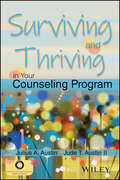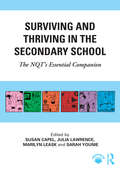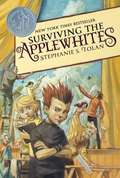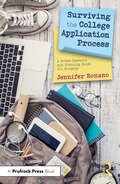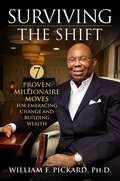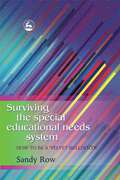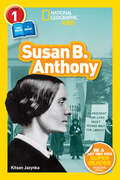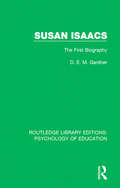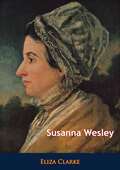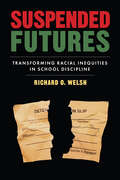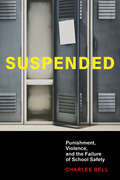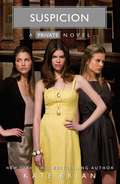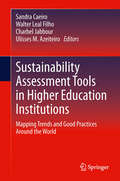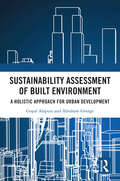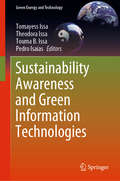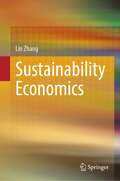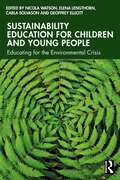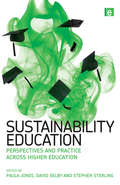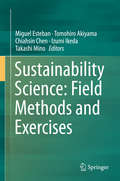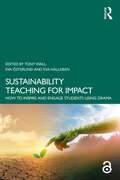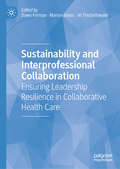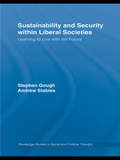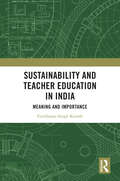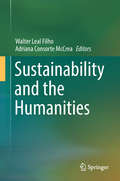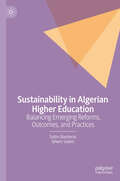- Table View
- List View
Surviving and Thriving in Your Counseling Program
by Jude Austin Julius Austin“Drs. Julius and Jude Austin have written a most informative and engaging guide for students navigating the demands of their academic program and internships. They provide practical wisdom in each chapter and serve as mentors to their readers through their self-disclosure and the lessons they have learned. This book needs to be in the hands of every counseling student, as it offers extremely useful pointers and encouragement to survive and thrive in their program.” —Marianne Schneider Corey, MA, LMFT, NCC —Gerald Corey, EdD, ABPP, NCC Professor Emeritus of Human Services and Counseling California State University, Fullerton “This is a valuable resource for students in graduate-level training in counseling or counselor education and supervision. In addition, it will be a useful update for counselor educators regarding the experiences of contemporary graduate counseling students.” —Richard E. Watts, PhD, LPC-S Sam Houston State University Written for graduate students who want to get the most out of their experience, this book presents down-to-earth discussions and suggestions on counselor training and life after graduation. The authors, both millennials and recent doctoral program graduates, draw upon their own personal and professional training and career experiences, as well as shared insight from a diverse group of current graduate students, recent graduates, and new professionals. The realistic, personal, and often humorous narratives throughout the book give an insider’s perspective on graduate school and illuminate the emotional journey of students and new professionals. Topics include choosing and getting into a program, handling the opportunities and challenges that each year of the program presents, gaining emotional maturity, dealing with setbacks, managing conflicts, increasing cultural awareness, getting a doctoral degree, searching for a job, finding a supervisor, and obtaining licensure. Readers will also be able to peek behind the curtains of faculty meetings to glean what faculty members expect, develop skills for their first session, and create and maintain a self-care plan for improving work-life balance. *Requests for digital versions from the ACA can be found on wiley.com. *To request print copies, please visit the ACA website here. *Reproduction requests for material from books published by ACA should be directed to permissions@counseling.org Julius A. Austin, PhD, isa clinical therapist and coordinator for the Office of Substance Abuse and Recovery at Tulane University. Jude T. Austin II, PhD, is an assistant professor and clinical coordinator in the Professional Counseling Program at the University of Mary Hardin-Baylor.
Surviving and Thriving in the Secondary School: The NQT's Essential Companion (Learning to Teach Subjects in the Secondary School Series)
by Julia Lawrence Marilyn Leask Sarah Younie Susan CapelWith an emphasis on developing a reflective, resilient approach that will ensure both effective teaching and teacher well-being, Surviving and Thriving in the Secondary School covers key issues that may be encountered in the day-to-day practice of teaching in the secondary school. With evidence-based practice at the forefront, this volume allows new teachers to avoid common pitfalls of teaching and it will help provide a new-found confidence within the classroom. Including a wide range of tasks that will help guide and demonstrate successful practice, this book covers topics and concerns such as: Building relationships within teaching Managing and responding to change Becoming an inclusive educator Working to improve classroom climate and pupil behaviour Assessment, homework and marking Inclusion of digital technologies and ICT Looking after yourself and your professional development Surviving and Thriving in the Secondary School can be utilised to help support and provide ideas on specific areas of concern, or it can be read as a continuing professional development (CPD) companion, allowing practice to be developed and refined. Written by world-renown experts in the field, this volume provides support for all newly qualified teachers and is an essential resource for the first year of teaching and beyond.
Surviving the Applewhites
by Stephanie S. TolanWill anyone take on Jake Semple?<P><P> Jake Semple is notorious. Rumor has it he burned down his old school and got kicked out of every school in his home state.<P> Only one place will take him now, and that's a home school run by the Applewhites, a chaotic and hilarious family of artists. The only one who doesn't fit the Applewhite mold is E.D.-a smart, sensible girl who immediately clashes with the unruly Jake.<P> Jake thinks surviving this one will be a breeze... but is he really as tough or as bad as he seems?<P> Newbery Honor book
Surviving the College Application Process: A Pocket Research and Planning Guide For Students
by Jennifer RomanoThe college admissions landscape and the steps to apply can be overwhelming and confusing! This mini guide is a quick resource highlighting key components to consider in the effort to decode and demystify the college application process for the college-bound student and their family. Covering topics such as essential application components, standardizing testing, personal statements, and financial aid, Surviving the College Application Process is your secret weapon for navigating the college research, planning, and selection process. Light-hearted and accessible, this book can be read from cover to cover or referenced as needed by college-bound students, their families, school counselors, and anyone interested in post-secondary education.
Surviving the Shift: 7 Proven Millionaire Moves for Embracing Change and Building Wealth
by William F. Pickard, PhDA positive attitude, the ability to adapt to change, and the willingness to learn from failure . . . these are all good markers of a successful person. But what does it take to become a successful entrepreneur—someone who can create something out of nothing? Someone who can start from the bottom and work their way to the top? In Dr. William Pickard&’s new book Surviving the Shift, this is exactly what he provides. As one of the country&’s most successful Black entrepreneurs, Dr. Pickard knows a thing or two about overcoming failure and mistakes to become an extraordinary entrepreneur. In this book, he details the highs and lows of his entrepreneurial evolution and offers seven proven principles for embracing change and building wealth. Surviving the Shift will teach you how to: · Develop positive vision and attitude. · Prepare for opportunities. · Understand that financing is not that difficult. · Build good relationships. · Choose a team with the right talent and skill set. · Learn from failure. · Cultivate strong faith. Successful entrepreneurship requires a shift in thinking, planning, and doing. It requires avoiding the many pitfalls people often face in business. Whether you are a new college graduate ready to make your mark on the world, someone who is trying to figure out the next step for their career, an aspiring entrepreneur, or you want to explore new ways to grow your business, you have the power to become the person you were meant to be. This book is your road map, and Dr. Pickard has equipped you with everything you need for your journey.
Surviving the Special Educational Needs System: How to be a ‘Velvet Bulldozer'
by Sandy RowSome children's 'difficulties' do not present in an obvious way, which makes diagnosis problematic, and access to help unforthcoming. This was the experience of Sandy Row, who, after a decade of misdiagnoses and unsatisfactory explanations for her children's struggle in mainstream school, realised that her children had special educational needs (SEN) and began her long quest for help from the SEN system. Row's testimony illustrates how the special educational needs system works and empowers other parents to demand help for their children who have special educational needs that require attention. This frank and practical book challenges the theoretical and often impenetrable established literature on SEN, and instead provides an accessible and effective resource for those needing advice and answers about their rights to services and help for their children.
Susan B. Anthony (Readers)
by Kitson JazynkaMeet one of the most important figures in women's and U.S. history. Just in time for the 100th anniversary of the 19th amendment giving U.S. women the right to vote, learn about Susan B. Anthony's remarkable life, from her childhood to her groundbreaking work.National Geographic Kids Readers have been a hit in the beginning reader category, and this book builds upon that success with a new approach--parents and children reading together. With the same combination of careful text, brilliant photographs, and fun approach to high-interest subjects that has proved to be a winning formula with kids, National Geographic Co-readers provide one page of adult read-aloud and one page of kid read-aloud text on each spread, building toward a collaborative reading experience.
Susan Isaacs: The First Biography (Routledge Library Editions: Psychology of Education)
by D.E.M. GardnerOriginally published in 1969, this is the first biography of Susan Isaacs, the first attempt to estimate her incalculable contribution to the theory and practice of the education of young children. As a pioneer of new teaching methods, Susan Isaacs will be remembered mainly for her work at the Malting House School in Cambridge in the 1920s, and her contribution was such that in 1933 the Department of Child Development at the University of London, Institute of Education was specially created for her; she was Head of the Department until 1943. But Susan Isaacs was also a psychoanalyst, and D.W. Winnicott in his Foreword refers to the time when he was supplying cases for her child analysis training: ‘I watched with interest her sensitive management of the total family situation, a difficult thing when one is engaged in learning while carrying out a psycho-analytic treatment involving daily sessions over years.’ D.E.M. Gardner, who was a close friend as well as student of Susan Isaacs, begins by describing Susan’s childhood in a Lancashire cotton town, and throughout the book she helps us to feel the force of Susan’s personality and intellect – ‘she was a truly great person, one who has had a tremendous influence for good on the attitude of parents and of teachers to the children in their care’.
Susanna Wesley
by Eliza ClarkeThis life of Susanna Wesley, the mother of John Wesley the founder, and of Charles Wesley the poet, of Methodism, differs from previous ones in not being written from a sectarian nor even from an eminently religious point of view. Having been much associated with those who had been in familiar inter course with Charles Wesley's widow and children, and having heard Susanna Wesley continually spoken of as a woman who underwent and overcame more difficulties than most, the ideal of her life early aroused my imagination. I was delighted with the opportunity of writing her memoir, and have done so with the sympathetic admiration natural to one in whose veins runs some of her blood, however much diluted.
Suspended Futures: Transforming Racial Inequities in School Discipline (Race and Education)
by Richard O. WelshAn incisive examination of the school discipline crisis and a strategic, evidence-driven playbook for educational decision-makers who aim to resolve disciplinary disparities
Suspended: Punishment, Violence, and the Failure of School Safety
by Charles BellThe disturbing truth: school suspension does more than impede Black students' academic achievement—it also impacts their parents' employment and can violate state and federal laws.Decades of urban disinvestment and poverty have made educational attainment for Black youth more vital than at any time in recent history. Yet in their pursuit of quality education, many Black families are burdened by challenging barriers to success, most notably the frequency and severity of school punishment. Such punishment is meant to be a disciplinary tool that makes schools safer, but it actually does the opposite—and is particularly harmful for Black students and their families.Focusing on schools in inner-city and suburban Detroit, Charles Bell draws on 160 in-depth interviews with Black high school students, their parents, and their teachers to illuminate the negative outcomes that are associated with out-of-school suspension. Bell also sheds light on the inherent shortcomings of school safety measures as he describes how schools fail to protect Black students, which leaves them vulnerable to bullying and victimization. The students he interviews offer detailed insight into how the lack of protection they received in school intensified their fear of being harmed and even motivated them to use violence to establish a reputation that discouraged attacks. Collectively, their narratives reveal how receiving a suspension for fighting in school earned them respect, popularity, and a reputation for toughness—transforming school punishment into a powerful status symbol that destabilizes classrooms.A thought-provoking and urgent work, Suspended calls for an inclusive national dialogue on school punishment and safety reform. It will leave readers engrossed in the students' and parents' tearful narratives as they share how school suspension harmed students' grades, disrupted parents' employment, violated state and federal laws, and motivated families to withdraw from punitive districts.
Suspicion: A Private Novel
by Kate BrianForbidden fruit... Reed, Noelle, and former Billings Girls Kiran and Taylor have been living it up on St. Barths over winter break. The tropical sun has melted away all the tensions of last semester, and for the first time in months, Reed is happy. She's got her best friends by her side, she has a palatial suite with an ocean view, and she's landed Upton, the most sought-after guy on the island. Reed is falling in love. But dating Upton makes Reed St. Barths' highest-profile guest -- and not in a good way. Upton has a dark past, and he's broken a lot of hearts. One of his exes still wants him. And she'll do whatever it takes to get Reed out of the picture.
Sustainability Assessment Tools in Higher Education Institutions
by Walter Leal Filho Sandra Caeiro Charbel Jabbour Ulisses M. AzeiteiroThis book contributes to debates on current sustainability practices, with a focus on assessment tools as applied in higher education institutions. These institutions are challenged to carry out management, research, and teaching, and to create settings that allow developing new competencies to address the complex global environmental, social, cultural, and economic pressures with which current and future generations are confronted. The first chapters discuss issues of sustainability in higher education, namely the role of universities in promoting sustainability and the emergent fields of sustainability science and education for sustainable development and how to integrate and motivate sustainability into the university. Subsequent chapters present examples of sustainability assessment tools specifically developed for higher education institutions, such as the AISHE - Auditing Instrument for Sustainability in Higher Education, the GASU - Graphical Assessment of Sustainability in Universities too, the STAUNCH - Sustainability tool for Auditing Universities Curricula in Higher Education. The use of other integrated tools are also presented. The papers have adopted a pragmatic approach, characterized by conceptual descriptions, including sustainability assessment and reorienting the curricula, on the one hand, and practical experiences on the other, with good practices from different edges of the world. Sustainability Assessment Tools in Higher Education Institutions will be of interest to graduate student, lecturers, researchers, and those setting university policy.
Sustainability Assessment of Built Environment: A Holistic Approach for Urban Development
by Gopal Alapure Abraham GeorgeThis book focuses on developing a holistic sustainability assessment model for built environment that can help in identifying sustainability issues and parameters for the built environment. It covers a wide range of sustainable built form issues in the local and regional contexts.The volume identifies significant built form sustainability indicators, criteria and sub-criterion while highlighting the importance of incorporating sustainability principles and assessment of sustainability. It also discusses the data collection process for defining priorities of sustainability parameters using the Analytic Hierarchy Process (AHP) technique. The book presents information to obtain fuzzy weights to classify assessed built form. The chapters in this book explain the development of an integrated built environment assessment system for infrastructure projects.This book will be of interest to students, teachers and researchers of planning, architecture, construction, urban studies, interior designing, urban planning and civil engineering. It will also be useful for architects, planners, civil engineers, interior designers, builders, developers, green building assessors and those interested in the sustainable assessment-built environment and urban development.
Sustainability Awareness and Green Information Technologies (Green Energy and Technology)
by Pedro Isaias Tomayess Issa Theodora Issa Touma B. IssaThis book addresses several aspects of environmental sustainability awareness and priorization, explores ways to use resources and processes more responsibly, and describes the strategies, models and tools required to overcome various challenges. Sustainable and green IT are used to minimize the current ICT recycling problems which are harming our planet. The book discusses the new green information technologies as alternatives to conventional ICT, which have significantly harmed nature, and examines how to make recent technologies such as cloud computing; social networking; smart technology; blockchains, IoT (internet-of-things); and big data sustainable. Exploring sustainability awareness and importance among individuals and organizations in the developed and developing countries, most of the contributions conclude that sustainability should be considered a duty in order to change mindsets, attitudes and actions so as to preserve our planet. Furthermore, it examines the green information technology strategies and models.
Sustainability Economics
by Lin ZhangThis book is an essential guide to understanding and tackling the complex challenges of sustainable development.It provides a thorough analysis of economic principles and their application to pressing sustainability issues. Covering everything from foundational theories and energy dynamics to environmental impacts and social justice, it provides actionable insights into how businesses, policymakers, and communities can drive sustainable progress. With a focus on real-world applications, it explores the latest in energy efficiency, climate policy, and green finance, making it a critical resource for students, professionals, and anyone passionate about creating a more sustainable future. Whether you're looking to deepen your understanding of sustainability economics or seeking practical strategies for implementing sustainable practices, this book offers a rich blend of theory, analysis, and practical guidance.
Sustainability Education for Children and Young People: Educating for the Environmental Crisis
by Carla Solvason Geoffrey Elliott Nicola Watson Elena LengthornThis seminal volume responds to the pressing need to prepare all children and young people for a sustainable future in light of the climate crisis, providing clear and accessible information and strategies on how to fully embed sustainability into pedagogy and supporting current and future educators.This book explores key environmental issues before exploring a range of pedagogies, each grounded in hope and exemplifying the principles of inclusion, empowerment, agency and social justice. Chapters explore major themes such as climate migration and displacement, climate activism, nature connectedness, sustainable leadership and eco‑anxiety to offer practical, scalable pedagogies that connect with the natural world. Designed to channel climate anxieties into energy for a reinvigorated, sustainable future of education, this book encourages an accessible and considered approach to classroom practice. Featuring contributions from wealth of international experts in the field, the volume ultimately provides a valuable resource for educators and students of education in all phases to develop the confidence to take an active lead in shaping education to help ensure a sustainable future.This book will appeal to educators, policymakers and researchers in environmental and sustainability education, teacher education, social justice education and educational leadership. Curriculum designers as well as those working across primary, secondary and higher education will also find the volume of interest.
Sustainability Education: Perspectives and Practice across Higher Education
by Stephen SterlingHow do we equip learners with the values, knowledge, skills, and motivation to help achieve economic, social and ecological well-being? How can universities make a major contribution towards a more sustainable future? Amid rising expectations on HE from professional associations, funders, policy makers, and undergraduates, and increasing interest amongst academics and senior management, a growing number of higher education institutions are taking the lead in embracing sustainability. This response does not only include greening the campus but also transforming curricula and teaching and learning. This book explains why this is necessary and - crucially - how to do it. Bringing together the experience of the HEFCE funded Centre for Sustainable Futures (CSF) at the University of Plymouth and the Higher Education Academy's Education for Sustainable Development Project, the book distills out the curriculum contributions of a wide range of disciplinary areas to sustainability. The first part of the book provides background on the current status of sustainability within higher education, including chapters discussing interdisciplinarity, international perspectives and pedagogy. The second part features 13 chapter case studies from teachers and lecturers in diverse disciplines, describing what has worked, how and why - and what hasn't. Whilst the book is organised by traditional disciplines, the authors and editors emphasise transferable lessons and interdisciplinarity so that readers can learn from examples outside their own area to embed sustainability within their own curricula and teaching. Subject areas covered include: geography, environmental and Earth Sciences, nursing/health, law, dance, drama, music, engineering, media and cultural studies, art and design, theology, social work, economics, languages, education, business and built environment.
Sustainability Science: Field Methods and Exercises
by Miguel Esteban Takashi Mino Tomohiro Akiyama Chiahsin Chen Izumi IkedaThis book builds up on the experience and lessons learnt by academics at the Graduate Program in Sustainability Science, Global Leadership Initiative (GPSS-GLI) at the University of Tokyo. A number of scholars in the new field of sustainability science describe how field methods and exercises are carried out in this discipline, together with the theoretical basis for such exercises. Case studies of various countries around the world where these exercises are carried out are showcased, emphasizing the various socio-economic considerations and problems facing humanity and possible ways forward to build more sustainable and resilient societies. The final objective is to enrich the field of sustainability science by describing the novel aspects used in the field exercises carried out by practitioners of this cross-disciplinary field.
Sustainability Teaching for Impact: How to Inspire and Engage Students Using Drama
by Tony Wall Eva Österlind Eva HallgrenSustainability Teaching for Impact is an essential step-by-step, practical guide for those wanting to inspire and engage higher education students in the areas of sustainability.This book encourages new and experienced university teachers across disciplines to adopt and adapt dramatic methods, with a view to develop their teaching. It introduces applied drama and performance arts methods that have been tried-and-tested across disciplines to deepen and broaden sustainability knowledge, skills, mindsets, and practices. Sustainability Teaching for Impact assumes no previous experience of the methods, as university teachers – with and without experience in drama – carefully walk you through some of the teaching practices they have used to create an impact in their teaching.This book is for higher and further education tutors who wish to build on their experience and deliver exciting and accessible classroom techniques and practices that are highly interactive, creative, and engaging to help further the teaching of sustainability.The Open Access version of this book, available at www.taylorfrancis.com, has been made available under a Creative Commons Creative Commons Attribution (CC-BY) 4.0 license.
Sustainability and Interprofessional Collaboration: Ensuring Leadership Resilience in Collaborative Health Care
by Marion Jones Jill Thistlethwaite Dawn FormanThis book is the fourth in the series on leadership, interprofessional education and practice, following on from Leadership Development for Interprofessional Education and Collaborative Practice (2014), Leadership and Collaboration: Further Developments for IPE and Collaborative Practice (2015) and Leading Research and Evaluation in Interprofessional Education and Collaborative Practice (2016). Along with policy changes around the globe, these three books have stimulated experts in this area to consider not only the ways in which they introduce and develop interprofessional education and collaborative practice, but also how they evaluate their impacts. In this 4th book, the focus is on the sustainability of these initiatives, sharing insights into factors that promote sustainability including leadership approaches and organisationsal resilience, as well as frequently encountered difficulties, and ways to overcome them.
Sustainability and Security within Liberal Societies: Learning to Live with the Future (Routledge Studies in Social and Political Thought #Vol. 58)
by Stephen Gough Andrew StablesMuch of the world will be living in broadly "liberal" societies for the foreseeable future. Sustainability and security, however defined, must therefore be considered in the context of such societies, yet there is very little significant literature that does so. Indeed, much ecologically-oriented literature is overtly anti-liberal, as have been some recent responses to security concerns. This book explores the implications for sustainability and security of a range of intellectual perspectives on liberalism, such as those offered by John Rawls, Robert Nozick, Frederick Hayek, Ronald Dworkin, Michael Oakeshott, Amartya Sen and Jürgen Habermas.
Sustainability and Teacher Education in India: Meaning and Importance
by Gursharan Singh KainthThis book provides an understanding of the importance of embedding and integrating the concept of sustainability into teacher education in India. It focuses on training teachers and educators towards achieving the principles of education for sustainability.The volume discusses the role of sustainability and its principles, in terms of its environmental, social, and economic dimensions in the professional development of teachers in the education system. It explains how teacher education is essential for introducing Education for Sustainable Development in school curriculums. It also highlights the role of sustainability in education for teachers in promoting environmentally responsible citizenship. While discussing the importance of training in-service and pre-service teachers to prepare them to implement such practices, it elucidates the meaning and significance of the National Curriculum Framework and its relationship with teacher education.This book will be of interest to teachers, students, and researchers of education, especially of teacher education, school education and education for sustainability. It will also be useful for academicians, educationalists, policymakers, teacher training institutes, and those preparing for competitive exams.
Sustainability and the Humanities
by Walter Leal Filho Adriana Consorte McCreaThis book explores the strong links between sustainability and the humanities, which go beyond the inclusion of social sciences in discussions on sustainability, and offers a holistic discussion on the intellectual and moral aspects of sustainable development. The contributions from researchers in the fields of education, social sciences, religion, humanities, and sustainable development fulfill three main aims:They provide university lecturers interested in humanities and sustainable development with an opportunity to present their work;foster the exchange of information, ideas and experiences acquired in the execution of teaching and research; anddiscuss methodological approaches and projects that provide a better understanding of how the humanities can contribute to the debate on sustainable development. Prepared by the Inter-University Sustainable Development Research Programme and the World Sustainable Development Research and Transfer Centre, the book reiterates the need to promote integrated approaches to sustainable development. Including practice-based lessons learnt that can be replicated further, it is a valuable resource for scientists and practitioners working in the humanities and sustainable development.
Sustainability in Algerian Higher Education: Balancing Emerging Reforms, Outcomes, and Practices
by Salim Bouherar Sihem SalemThis volume provides a comprehensive overview of the current state of sustainability in Algerian higher education. It examines the policies, initiatives, and practices that have been implemented across universities and other educational institutions, while also identifying the gaps and opportunities that remain. Through case studies, interviews, and analyses, the authors explore how these institutions are working to align their missions with the broader goals of sustainable development, and how they are contributing to the national and global discourse on sustainability.
